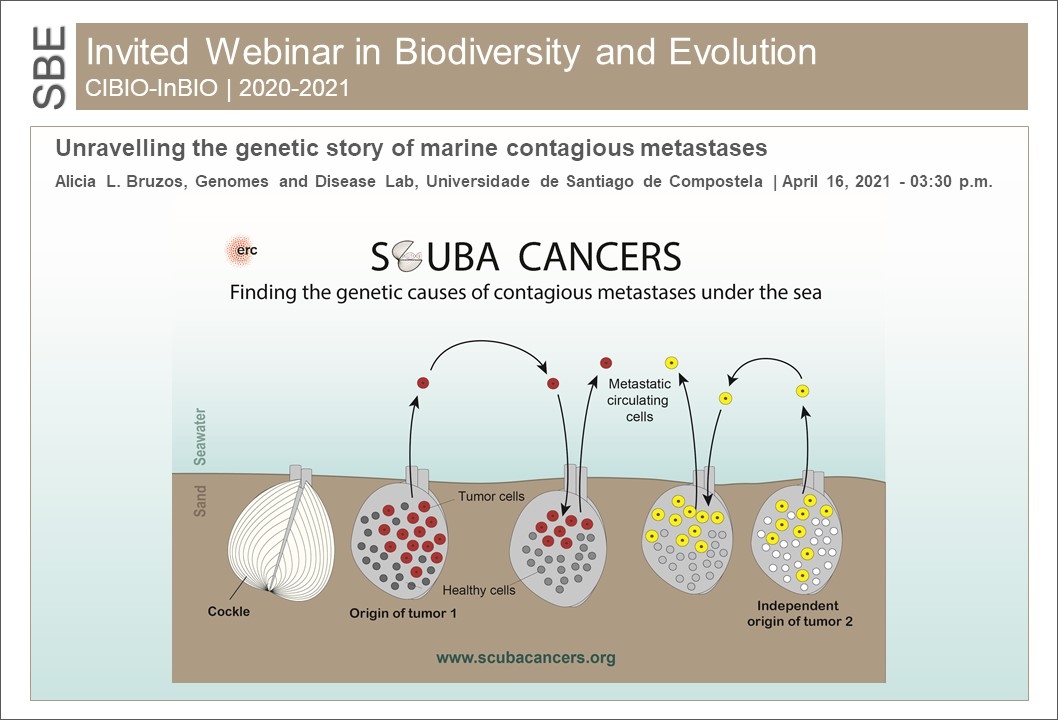Unravelling the genetic story of marine contagious metastases
16 Apr 2021 - Alicia L. Bruzos, Genomes and Disease Lab, Universidade de Santiago de Compostela |15h30

INVITED TALK - WEBINAR IN BIODIVERSITY AND EVOLUTION
Clonally transmissible cancers are somatic cell lineages that are transmitted between individuals via the physical transfer of living cancer cells. These cancers are particularly frequent in marine bivalves, in which the disease is presented in the form of a leukaemia called hemic neoplasia (HN) characterized by the proliferation of abnormal circulating cells in the haemolymph. HN tumour cells behave like metastatic cells, leaving their hosts to dive in the marine environment until they reach a new host and propagate inside it. We use HN in cockles to understand the genetic mechanisms of cancer transmissibility between individuals.
We have collected 6,300 cockles from 35 sampling points and 11 countries all across the Atlantic Coast of Europe, from Morocco to Russia. We observed prevalence disparity across cockle populations, with countries where disease reaches high prevalence rates, and others with no disease at all. We sequenced the whole genomes of 88 tumours and 432 healthy cockles with Illumina paired-end sequencing. Cockle transmissible cancers are tumours with a polyphyletic origin so, we performed phylogenetic analyses in the mitochondrial DNA to infer their clonal structure and compare it with the nuclear DNA structure. I will present on behalf of the scuba cancers project and all my colleagues, our results including some preliminary outcomes of the genetic causes underlying contagious cancers in cockles.
Alicia L. Bruzos is a PhD student in Molecular Medicine and Teaching Assistant in the Department of Genetics of Universidade de Santiago de Compostela (Spain). Her field of expertise is cancer genomics with a special focus on transmissible cancers and their genetic causes underlying transmissibility and metastasis.
She graduated in 2015 in Biological Sciences from the University of Santiago de Compostela (Spain); afterwards, and having completed her degree thesis with honours, she completed a Master in Bioinformatics from the Autonomous University of Barcelona (Spain). She obtained a national PhD fellowship on a competitive concurrence in 2017 and she co-authored two outstanding publications of the Pan-Cancer project that have been published in the journals Nature and Nature Genetics in 2020. During her PhD, she did four stages in International Research Institutions: Pacific Northwest Research Institute (Metzger lab, Sept-Dec 2018; Seattle, USA), National University of Ireland Galway (Marine Environment lab, Mar-Apr 2019; Galway, Ireland), Universidade de Vigo (Phylogenomics lab, Sept-Dec 2020; Vigo, Spain) and Korean Advanced Institute of Science and Technology (Cancer genomics lab, Jan-Apr 2021; Daejeon, South Korea).
[Host: Raquel Vasconcelos, Conservation Genetics and Wildlife Management - CONGEN]
Click here to watch the webinar recording
Click here to watch the webinar recording